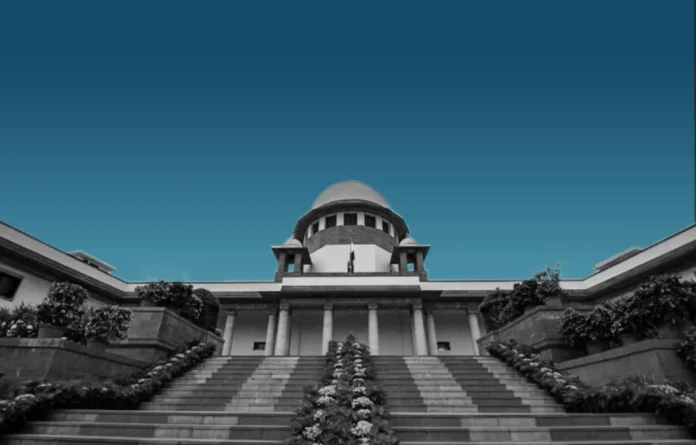The Supreme Court on Monday stayed the Allahabad High Court verdict that directed redrawing of the recruitment list of candidates to fill up 69,000 vacancies of Assistant Teachers in Uttar Pradesh.
The Bench of Chief Justice of India DY Chandrachud, Justice JB Pardiwala and Justice Manoj Misra issued notice in the matter and asked the counsels appearing for the parties to submit their brief notes on the arguments to the two nodal counsels appointed by the Apex Court.
The Bench further permitted the state of Uttar Pradesh, represented by Additional Solicitor General Aishwarya Bhati, to file its brief submissions independently.
The question posed before the Apex Court was whether a person who entered into a reservation category, could subsequently migrate to the general category.
The Division Bench of Justice AR Masoodi and Justice Brijraj Singh last month quashed the earlier merit lists issued by the government of Uttar Pradesh on June 1, 2020 and January 5, 2022 and directed the preparation of fresh merit lists.
The High Court held that reservation under Section 3(6) of the Uttar Pradesh Public Services (Reservation for Scheduled Castes, Scheduled Tribes and Other Backward Classes) Act, 1994 in the selection of Assistant Teachers in the State shall be applicable at the stage of preparation of merit list after including the result of the Assistant Teachers Recruitment Examination (ATRE) along with other qualification.
It directed that any reserved category candidate who secured merit equivalent to that of a general category candidate shall be placed in the general category as per Section 3(6) of the 1994 Act.
Section 3(6) provides that if any reserved category candidate under the Section gets selected based on merits in an open competition with the general candidates, he/she shall not be adjusted against the vacancies for the reserved category candidates.
The Apex Court today stayed this High Court order stating that for the selection process, there was an ‘Assistant Teachers Recruitment Examination (ATRE), in which the cut-off for the general category was kept at 65 marks while the reserved category was 60 marks.
Once a candidate from the schedule caste qualified, he ended up being in both the general and reserved list. By the notification dated January 1, 2019, any person for the reserved category scoring 65 marks and above was only considered under general category, while any other reserved candidate scoring less than 65 marks was kept under the reserved category only. If it was only a qualifying exam, then reservation could not be decided on the basis of a qualifying exam, it added.
The government of Uttar Pradesh had framed Service Rules 1981 for the selection and recruitment of Assistant Teachers in the primary schools run by the state under the U.P. Basic Education Act, 1972.
Rule 8 of the said Rules prescribed qualifications for appointment of the Assistant Teachers. Rule 9 provided for reservation and Rule 14 provided for procedure of appointment on the post of Assistant Teacher.
The U.P. Public Services (Reservation for Scheduled Castes, Scheduled Tribes and Other Backward Classes) Act, 1994 was enacted to provide equal opportunity to reserved category candidates seeking appointment to posts of Assistant Teachers. The state issued a government order on March 25, 1994, allowing migration of meritorious reserved candidates, even if the benefit of relaxation was taken by the reserved category candidates.
In 2011, the government of Uttar Pradesh amended the Service Rules 1981 to include the Teachers Eligibility Test (TET) as the minimum qualification for Assistant Teachers, to improve the standard of basic education Teachers.
The amendment was upheld by the Supreme Court with certain ‘beneficial’ directions for the Shiksha Mitra. Subsequently, Rule 8(1)(ii)(a) of the Service Rules, 1981 was further amended to include passing the Assistant Teachers Recruitment Examination as a mandatory qualification for appointment as Assistant Teacher. Rule 14 and its Appendix were amended to take 60 percent of the ATRE marks as weightage.
After the notification for the first ATR Examination, the same was removed as a minimum qualification but was added as a step in the selection process under Rule 14.
While deciding to fill up 69,000 vacancies with ATRE, the state government did not mention any compartmentalisation of candidates for or implementing vertical reservation. However, vide an advertisement, it was stated that the minimum qualifying marks for the unreserved category was 65 percent and for the reserved category was 60 percent.
It was stated that this was for classification and not reservation. It was also clarified that passing ATRE was only an eligibility criterion and did not accrue any right to appointment. Another amendment was carried out in 2019 by which a pre-qualification for appearing in the ATRE was added retrospectively from June 28, 2018, which was the date of the notification.
The Division Bench of the Allahabad High Court had earlier held that ATRE was only for qualifying and not part of recruitment process to ascertain reservations and selections.


